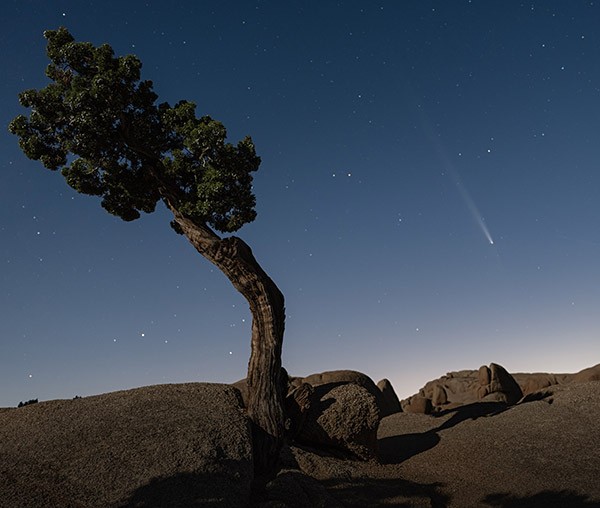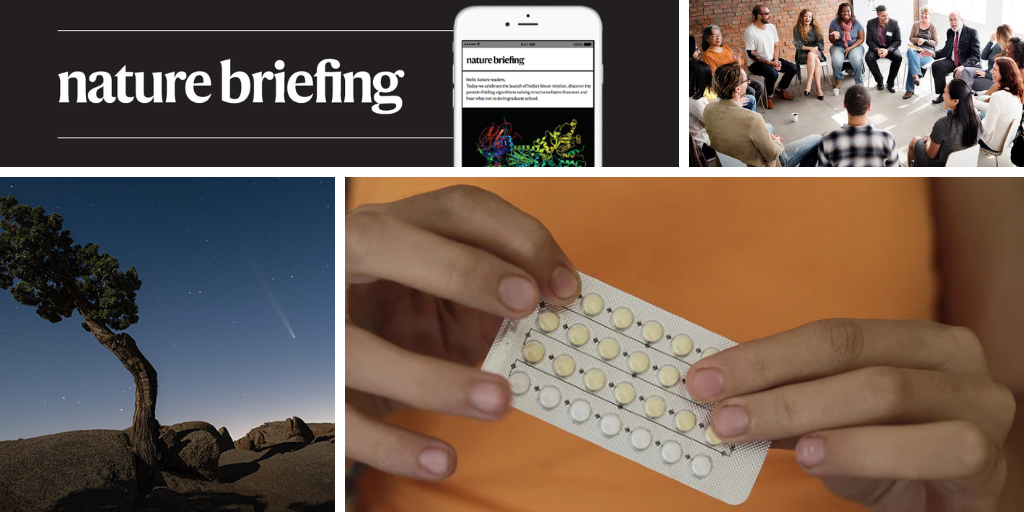Hello
Nature
readers, would you like to get this Briefing in your inbox free every day?
Sign up here
.

Researchers are cataloguing the effects of birth control on the brain.
Credit: Isabel Pavia/Getty
Neuroscientist Carina Heller scanned her own brain 75 times over a year to study the effects of the menstrual cycle and oral contraceptives on the brain. She found a rhythmic pattern of change in brain volume and connectivity between brain regions over the course of her natural cycle, with
volume and connectivity dipping slightly while she was taking the pill
. Heller has joined a group of investigators filling gaps in women’s health research by scanning their own brains. “She gave herself up to science,” says neuroscientist Emily Jacobs. “And as a result, we now have this greater insight into the human brain.”
Researchers in central Mexico have transplanted a forest of almost 1,000 oyamel fir trees (
Abies religiosa
) to a mountain in Michoacán. If they survive a few decades, the
trees could help to shield the migratory eastern population of monarch butterflies
(
Danaus plexippus
), which spend the winter roosting in oyamel fir forests, from the impacts of climate change. It would require a lot of effort to plant enough trees to provide refuge for the butterflies, “but that may be the only choice down the road,” says ecologist John Pleasants.
Reference:
Frontiers in Forests and Global Change
paper
A chatbot-like tool powered by artificial intelligence (AI), developed by Google DeepMind, can help people with differing views to find areas of agreement. In an experiment with online discussion groups, the model was able to
synthesize diverging opinions and produce summaries of each group’s position that took different perspectives into account
. Participants preferred the AI-generated statements to ones written by human mediators. However, the model was not trained to intervene in the debate, which means that if applied in the real world, the model’s statements could include extremist or other problematic beliefs expressed by participants.
Reference:
Science
paper
Studying how magma behaves underground could help harness powerful geothermal energy. Scientists from the Krafla Magma Testbed (KMT) in Iceland
plan to drill into the magma beneath the Krafla volcano
, starting in 2027. Pressure and temperature sensors will be placed in the first of two boreholes to track changes to the magma, which could help predict volcanic eruptions. The second will house a test run for a new type of geothermal power station. “[Magma] are the heat source that power the hydrothermal systems that lead to geothermal energy. Why not go to the source?” says Yan Lavallée, volcanologist and head of KMT’s science committee.
Features & opinion
“If we understand the worm, we understand life,” says geneticist Robert Waterson. He isn’t talking about just any worm, he’s referring to
Caenorhabditis elegans
,
the 1 millimetre nematode that’s been extensively studied as a model organism.
Research using this species has resulted in at least 4 Nobel Prizes
, with a recipient making sure to shout-out their favourite worm each time. One of the winners of this year’s Nobel Prize in Physiology or Medicine, molecular biologist Gary Ruvkun, lauded the species with its highest honour so far, recognizing it as “badass”.
The New York Times | 5 min read
You’ve received yet another request to write a recommendation letter, but
you’re not sure you can give this particular candidate a glowing reference
. What now? If politely declining isn’t an option, it’s important to view the candidate in the most positive light while also noting their limitations in a constructive way. “You may not have the best experience working with them, but in a different environment, they might end up being a superstar,” says biochemist James Murphy.
Today, the 16th meeting of the Conference of the Parties to the Convention on Biological Diversity (COP16) begins in Cali, Colombia. High on the agenda is reaching
an agreement on how lower-income countries can better share in the benefits that stem from their resources
— including any monetary benefits deriving from genetic sequence data. But as late as last week, draft text on the matter contained 200 unfinalized points. Delegates must not rush an agreement, says a
Nature
editorial, or they risk disrupting research without notably benefiting lower-income countries.
Image of the week

Comet C/2023 A3 (Tsuchinshan-ATLAS) streaks across the sky over Joshua Tree National Park in California on 15 October 2024. Discovered in early 2023, the comet was first visible in some countries in the Southern Hemisphere on 29 September. See
more of the best photos of the comet
. (
BBC Sky at Night | 6 min read
) Credit: Qian Weizhong/VCG via Getty
On Friday, Leif Penguinson was enjoying Patagonia National Park in Chile.
Did you find the penguin
? When you’re ready,
here’s the answer
.
Feedback on this newsletter is always welcome at
[email protected]
.
Thanks for reading,
Jacob Smith, associate editor, Nature Briefing
With contributions by Gemma Conroy
Want more? Sign up to our other free Nature Briefing newsletters:
•
Nature Briefing: Careers
— insights, advice and award-winning journalism to help you optimize your working life
•
Nature Briefing: Microbiology
— the most abundant living entities on our planet — microorganisms — and the role they play in health, the environment and food systems
•
Nature Briefing: Anthropocene
— climate change, biodiversity, sustainability and geoengineering
•
Nature Briefing: AI & Robotics
— 100% written by humans, of course
•
Nature Briefing: Cancer
— a weekly newsletter written with cancer researchers in mind
•
Nature Briefing: Translational Research
— covers biotechnology, drug discovery and pharma


